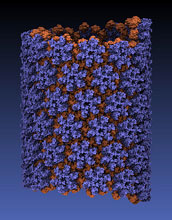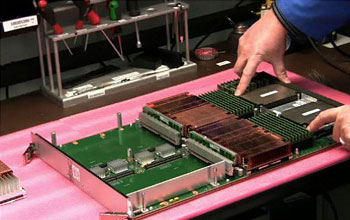All Images
News Release 12-054
NSF's Most Powerful Computing Resource Has Opened Its Doors to Six Science Teams
From climate change to the HIV infection to the evolution of the universe, tool enables researchers to address some of the world's most challenging scientific questions
This material is available primarily for archival purposes. Telephone numbers or other contact information may be out of date; please see current contact information at media contacts.

From Klaus Schulten's project about HIV infection, this image is of the first all-atom structure of an HIV virus capsid in its tubular form. Schulten and his team at the University of Illinois at Urbana-Champaign are studying the protein capsid that encases the HIV-1 genome. The process through which this capsid disassembles, releasing its genetic material, is a critical step in HIV infection. Schulten's group will simulate a cylindrical capsid consisting of 12.5 million atoms.
Credit: Courtesy of Klaus Schulten, University of Illinois at Urbana-Champaign Theoretical and Computational Biophysics Group/Beckman Institute; Angela Gronenborn and Peijun Zhang, University of Pittsburgh School of Medicine Center for HIV Protein Interactions/Department of Structural Biology.
Download the high-resolution JPG version of the image. (226 KB)
Use your mouse to right-click (Mac users may need to Ctrl-click) the link above and choose the option that will save the file or target to your computer.

Blue Waters' compute blades--which include processors, interconnect and memory--are the heart of what will be one of the most powerful supercomputers in the world. See a video with Cray's Steve Samse showing NCSA the compute blades.
Credit: NCSA
Download the high-resolution JPG version of the image. (240 KB)
Use your mouse to right-click (Mac users may need to Ctrl-click) the link above and choose the option that will save the file or target to your computer.
